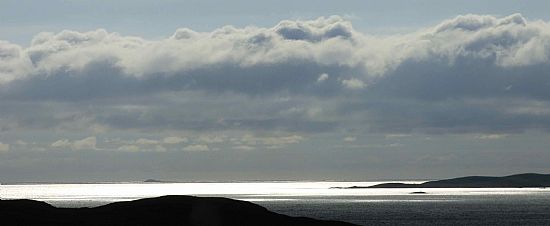Home and Away

Photo: Beyond the Silver Sea? E. Stewart
Being earthed
We shall probably never know how territorial our very first, hunter-gatherer ancestors were or how they perceived “home”.
Settlement and cultivation of the land must have gradually changed that sense of both personal and communal identity as owners, exploiters and defenders of the natural resources available in a place they occupied and inhabited.
Opposing human attitudes towards territory can be expressed perhaps as "we belong to the land" or "the land belongs to us". At no time, however, is there any proof that the notion of land to people relationship has been totally static nor that either perception has ever been universally accepted.
Understanding the ideologies behind the current Jewish/Palestinian conflicts about "God's Promised Homeland" can be very instructive for all land disputes.
People have probably always moved out from their “homelands” (whether they were seen as “motherlands” or “fatherlands”) for diverse reasons en masse, in small groups and individually.
The journey and the new terrain would all have presented their own difficulties which some overcame and others did not.
The Highland Clearances, victim mentality and nostalgia.
For some time the whole story of the Scottish diaspora was dominated by the deeply distressing accounts of "The Highland Clearances".
These have created a notion of victimisation for all who went overseas and a nostalgia for “home”, They have also fed into a wider history of national and class injustices in which the ordinary Scot was seen either as the victim or the rebel.
It is now recognised that this is definitely not the whole story. In the area chosen here it is simply not the case that the landlords or their factors ruthlessly exported their "surplus population".
It is true that changes in agriculture and over-population with regard to the available land played their part but what is emerging strongly is the opportunist courage of many people who struck out, “brizzed yont”, to make fortunes (not always successfully) particularly via trade and commerce.
The main categories of migrants can be classified as military, religious exiles, scholars and teachers, doctors, traders and merchants, farmers and estate-seekers, prisoners, escapees, deported prisoners of war or criminals and industrial workers.
Some suggested further reading:
M Douglas: “The Idea of a Home” in Social Research 58 Vol 1 1991
J. Duyvendak: The Politics of Home, Palgrave Macmillan 2011
M. Freeman “Telling Stories: Memory and Narrative” pp 263-277 in (eds) : S Radstone and B Swarz: Memory, Histories, Theories, Debates ,NewYork. Fordham University Press 2010
M. Sarup: “Home and Identity”pp 93-104 in (eds) : Traveller’s Tales: Narratives of Home and Displacement, London/N/Y Routledge 1994
(eds): Rainer Baubock and Thomas Faist: Diaspora and Transnationalism: Concepts, Theories, Methods, Amsterdam University Press 2010
Murray Stewart Leith and Duncan Sim: “Diaspora Tourists and the Scottish Homecoming” in The Journal of Heritage Tourism, Vol 8 Issue 4 pp 259-274.
(eds) Murray Stewart Leith and Duncan Sim: The Modern Scottish Diaspora, Cotemporary Debates and Perspectives, Edinburgh University Press 2014
(eds): Mary C. Beaudry, James Symonds: Interpreting the Early Modern World Transatlantic Perspectives 2011 (can be read via Google Books or via a library since it is, like many modern academic books, sadly, beyond price!)

